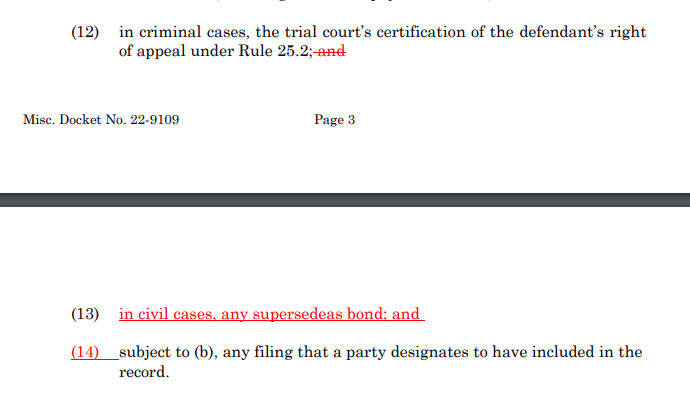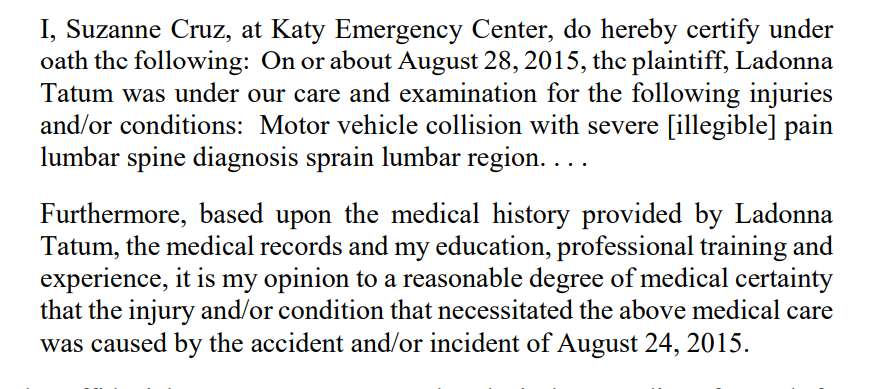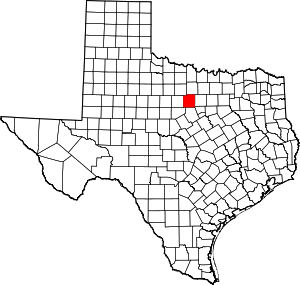 The governor has appointed Hon. Emily Miskel to the vacant position on the Fifth Court. Judge Miskel brings a strong background in family law and community involvement to the Court. Welcome, now-Justice Miskel!
The governor has appointed Hon. Emily Miskel to the vacant position on the Fifth Court. Judge Miskel brings a strong background in family law and community involvement to the Court. Welcome, now-Justice Miskel!
Monthly Archives: December 2022
The supreme court is reviewing the Fifth Court’s case of Kansas City Southern Ry. v. Horton, a case that presents a mix of federal-preemption and Casteel issues. It will also review CAE SimuFlite v. Talavera, which presents a similar mix of substance (whether Texas recognizes a claim for educational malpractice) and procedure (Rule 91a’s proper role). The supreme court’s summary of issues appears here.
The supreme court has preliminarily approved this addition to the Tex. R. App. P. about the clerk’s record:
 Hopefully, this change will make it easier to follow Tex. R. App. 43.5 (and its supreme court analog), which says: “When a court of appeals affirms the trial court judgment, or modifies that judgment and renders judgment against the appellant, the court of appeals must render judgment against the sureties on the appellant’s supersedeas bond, if any, for the performance of the judgment and for any costs taxed against the appellant.”
Hopefully, this change will make it easier to follow Tex. R. App. 43.5 (and its supreme court analog), which says: “When a court of appeals affirms the trial court judgment, or modifies that judgment and renders judgment against the appellant, the court of appeals must render judgment against the sureties on the appellant’s supersedeas bond, if any, for the performance of the judgment and for any costs taxed against the appellant.”
 A contentious easement dispute led to, among other matters, a damages judgment for the defendant’s alleged barricading of an access road. The damages included delay costs incurred when a contractor charged an extra fee after a TRO stopped the process of paving the road. Applying DeSantis v. Wackenhut Corp., 793 S.W.2d 670 (Tex. 1990), the Fifth Court found that those damages were not recoverable on this claim:
A contentious easement dispute led to, among other matters, a damages judgment for the defendant’s alleged barricading of an access road. The damages included delay costs incurred when a contractor charged an extra fee after a TRO stopped the process of paving the road. Applying DeSantis v. Wackenhut Corp., 793 S.W.2d 670 (Tex. 1990), the Fifth Court found that those damages were not recoverable on this claim:
“The trial court’s temporary restraining order cannot be [defendant’s] breach. And to the extent [Plaintiff] argues the order was wrongful, she did not allege either of two possible actions for wrongful injunction, nor prove the elements of malicious prosecution.”
MQ Prosper North LLC v. Coulter, No. 05-20-00880-CV (Dec. 12, 2022) (mem. op.).
 In re Torres granted relief in a failure-to-rule mandamus proceeding. The issue of the effect of COVID-19 came up in the Fifth Court’s review of the record, and the Court observed:
In re Torres granted relief in a failure-to-rule mandamus proceeding. The issue of the effect of COVID-19 came up in the Fifth Court’s review of the record, and the Court observed:
Although real parties Diaz and Galvan make the general claim that trial courts are facing staffing shortages and COVID-related delays, the record before this Court does not contain any indication that the COVID-19 pandemic has prevented the trial judge from ruling on the pending motion. … Indeed, as this Court has noted in a prior case, “courts across Texas—including this Court—have continued to fully tend to most business of the courts and serve the citizens of Texas while implementing safety precautions above and beyond recommendations by the Centers for Disease Control and Prevention and accommodating Covid-19-related exigencies.”
No. 05-22-00715-CV (Dec. 7, 2022) (mem. op.) (citations omitted).
The supreme court granted mandamus relief as to an overly broad request for cellphone data in the case of In re Kuraray America, holding:
[W]e conclude that the trial court abused its discretion by ordering production of Kuraray’s employees’ cell-phone data for a six-week or four-month period without a showing that each employee’s use of his cell phone on May 18 or 19 could have been a contributing cause of the ethylene release. …
Plaintiffs argue that cell-phone data from days, weeks, and months before the release is relevant because Kuraray negligently failed to supervise its employees and failed to implement adequate policies and procedures to protect against cell-phone misuse. But Kuraray’s policies regarding cell-phone use and its alleged failure to supervise its employees are relevant only if there is some evidence that cell-phone use could have been a contributing cause of the release itself.
No. 20-0268 (Dec. 9, 2022).
The Fifth Court clarified what is, and isn’t, in the record when the resolution of a summary-judgment motion involves motions for reconsideration/new trial:
- “When a motion for reconsideration or new trial is filed after a summary judgment motion is heard and ruled upon, the trial court may ordinarily consider only the record as it existed before hearing the motion for the first time.”
- BUT: “[A] trial court may accept summary judgment evidence filed late, even after summary judgment, as long as the court affirmatively indicates in the record that it accepted or considered it. Where the trial court affirmatively indicates on the record that it accepted or considered the evidence attached to a motion to reconsider, this court reviews ‘the summary judgment based upon the grounds and proof in both prejudgment and post-judgment filings.'”
Chang v. Liu, No. 05-20-00977-CV (Nov. 23, 2022) (mem. op.) (citations pmitted).
A medical records prove-up affidavit in McGee v. Tatum said the following:
 But that statement was insufficient to establish causation: “[N]othing in the record shows that Cruz is a medical professional or that she was testifying as an expert medical professional. Furthermore, Cruz’s statement is nothing more that a ‘bare proclamation that this one event caused another and is not enough to establish causation.’” No. 05-21-00303-CV (Nov. 28, 2022) (mem. op.).
But that statement was insufficient to establish causation: “[N]othing in the record shows that Cruz is a medical professional or that she was testifying as an expert medical professional. Furthermore, Cruz’s statement is nothing more that a ‘bare proclamation that this one event caused another and is not enough to establish causation.’” No. 05-21-00303-CV (Nov. 28, 2022) (mem. op.).
 The venue issue in 7R Owners Assoc. v. Prezas was whether the defendant’s “principal office” was located in Dallas County. The following testimony did not support an argument that it was located there, as opposed to Palo Pinto County:
The venue issue in 7R Owners Assoc. v. Prezas was whether the defendant’s “principal office” was located in Dallas County. The following testimony did not support an argument that it was located there, as opposed to Palo Pinto County:
Mr. Ruff testified in May 2022 that he lives in Dallas. And since 2013, he has worked approximately one or two days a week out of 7R’s office in Palo Pinto County. He said that he works on 7R matters during “that same timeframe,” and he spends the rest of the week working on “other matters.” Appellees argue that, because Mr. Ruff lives in Dallas and is 7R’s sole officer and employee, “to the extent that 7R does conduct ‘daily affairs’” when Mr. Ruff is not in the Palo Pinto County office, those affairs are “necessarily performed in Dallas County by Mr. Ruff.”
No. 05-22-00776-CV (Nov, 30, 2022) (mem. op.).